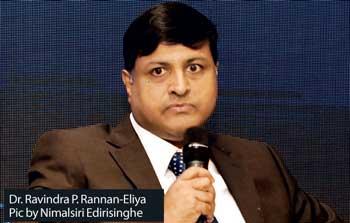20 Sep 2019 - {{hitsCtrl.values.hits}}
 Head of the Institute for Health Policy (IHP), a regional centre of excellence for health policy research stated that the country’s current healthcare system is unable to undergo any improvements as the low tax income and political interference make it challenging to embark on any service upgrades.
Head of the Institute for Health Policy (IHP), a regional centre of excellence for health policy research stated that the country’s current healthcare system is unable to undergo any improvements as the low tax income and political interference make it challenging to embark on any service upgrades.
IHP Executive Director (ED) Dr. Ravindra P. Rannan-Eliya, while addressing the Sri Lanka Economic Summit 2019 earlier this week pointed out that despite the many achievements witnessed in the welfare-based health system in the country, stakeholders are faced with a number of hurdles in enhancing the State medical sector.
“It is difficult to improve the highly politicized healthcare sector with a very low tax income. These are the two major constraints in uplifting the sector,” said Dr. Rannan-Eliya addressing a panel.
He asserted that unless the tax income increases from 12 percent to 18 percent, welfare services such as healthcare and education will not reach the next level
of development.
The chief elaborated that Sri Lanka does not have enough taxes to offer the same level of services as private sector hospitals. Currently, even when receiving treatments from the State healthcare system, patients are required to get from private hospitals a number of tests, and even procedures such as MRI scans, bypass surgeries, and stent placements, due to the non-availability or limited availability of equipment.
“The public hospitals do not have the hard cash to invest in equipment. Unless people are willing to spend more tax money, there is no way that the sector can be uplifted to offer services like in other countries, particularly Singapore, for medical tourism,” said the ED of the institute which is also an independent research facility.
According to Dr. Rannan-Eliya, Sri Lanka has an “unusual” system and is “stuck” within that. He professed that the island nation by no means can have economic growth unless in place is a broad-based tax system.
Healthcare in Sri Lanka is provided by the government, private sector, and to a limited extent by non-profit organizations. The government sector is predominantly financed by general revenue taxation. The public sector healthcare is universally accessible to the entire population of Sri Lanka and is almost wholly offered for free. (SAA)
14 Nov 2024 54 minute ago
14 Nov 2024 2 hours ago
14 Nov 2024 2 hours ago
14 Nov 2024 2 hours ago
14 Nov 2024 3 hours ago